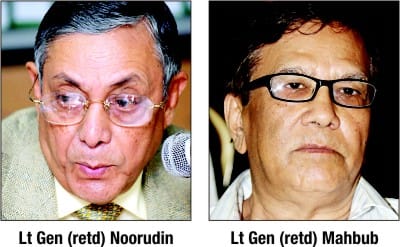2 generals sought US support for coup

Two former army chiefs had aspired to see changes in “dynastic politics” courtesy a US-aided coup in 2004, according to a leaked diplomatic cable.
The cable sent to Washington by the then US ambassador in Dhaka Harry K Thomas in late 2004 was published by whistleblower website WikiLeaks on August 30 this year.
It said the United States rejected the requests of the two army men.
Former army chief and Awami League minister Lt General (retd) Noorudin Khan had asked for support from the US government in ending Bangladesh's administration in 2004 and bringing a government of national unity consisting of senior leaders from both the major parties.
Also, another ex-chief of Bangladesh Army and standing committee member of BNP, Lt Gen (retd) Mahbubur Rahman, had told the US ambassador that the military would always look to the US government for a signal to go ahead with a coup.
Thomas was referring to his encounters with the two in quick successions on September 13 and 16 in 2004 when they had asked for such support and signal.
The ambassador dined with Noorudin on September 16, 2004 when the latter sought US assistance in bringing a government of national unity to power and ridding Bangladesh of Sheikh Hasina and Khaleda Zia through a series of mass agitations.
According to the cable, the ambassador told Noorudin that the US supports democracy and stability and cannot sanction any extra-constitutional means of removing the government.
A member of AL government's cabinet in 1996, Noorudin responded that Bangladesh's future is hostage to two women who cannot put aside their difference for the nation's sake. He accused the Bangladesh government of bankrupting the military.
He said the seven top generals, whom he derided as the “malevolent seven”, were classmates of the then prime minister Khaleda's brother Major (retd) Eskander. They were chosen for their loyalty and not competence.
The government had started the politicisation of the officers' corps during Khaleda Zia's first term (1991-96) and Sheikh Hasina during her tenure (1996-2001) had accelerated it, he added.
The ex-army chief recommended General Abu Tayeb Mahammad Zaahirul Alam (called Gen Zahir), commandant of the National Defense College, for taking charge of the country.
Gen Zahir is a true supporter of democracy and would form a government with competent ministers from both parties for two to three years to improve the country's weak institutions, draft a new constitution, end corruption and attract much needed foreign investment before holding internationally observed democratic elections, he said.
He further alleged the administration then had feared coups even from Eskander's batchmates and sidelined Maj Gen Rokon to the Quartermaster Corps earlier in 2004 because he was thought to be a threat to the government.
Noorudin, resigned from Awami League in early 2004, frustrated with its inability to focus on the future. He accused Hasina of losing her cards after the August 21 grenade attack that year.
Instead of calling for an independent investigation and taking the moral high ground, she insisted on repeated strikes and attempted to bring the government down. She lost popular support and an unintended consequence may be that the government no longer felt compelled to solve the crime, he said.
He said an interim military government is the only alternative to continued dynastic politics. He said Khaleda Zia's two sons -- Tarique Rahman and Arafat Rahman -- would terrorise the country, extort money from businesses and ruin the economy.
He also belittled the political abilities of Hasina's son and sister, asserting they were equally corrupt and venal like the Rahmans.
Noorudin, in part, blamed himself for the country's current predicament. He said when Bangladeshi military dictator Gen Ershad was forced out of office in 1990, then Pakistani military chief Alam Beg, an old friend and colleague, sent him an emissary urging that Noorudin become the President.
As he refused, Alam Beg asked whom should Pakistan support. Noorudin recommended Pakistan support BNP because it consisted of military officers and small businessmen he believed would lead the country in the right direction.
Pakistan then used the Inter-Services Intelligence (ISI) to fund BNP and India's Research and Analysis Wing (RAW) began funding Awami League. Such funding continued to this day, he said, adding: “We have become the playground for India and Pakistan.”
He also claimed that New Delhi was unhappy with Sheikh Hasina's performance and funded both parties during the 2001 elections.
He said RAW funded Tarique Rahman, who pledged to win over his mother on gas exports and water sharing differences but was unable to do so. He predicted New Delhi would work hard to bring Hasina back to power in 2006.
According to the leaked cable, Noorudin said the government is catering to the "disastrous policies" of Islamic parties in the four-party ruling coalition to ensure its win in the 2006 elections.
He blamed the government's decision to ban books of the Ahmadiyya sect and not to follow-up on attacks in Sylhet on the then British high commissioner in Bangladesh and city mayor on its need to protect the Islamists.
On September 13, 2004, Lt Gen Mahbubur Rahman, also a BNP lawmaker, told Thomas that the military would always look to the US government for a signal to go ahead with a coup.
The US government had played a positive role in helping to thwart two potential coups in 1996 and a no from the US government would always carry weight, Mahbubur said.
While expressing disdain for Sheikh Hasina and Khaleda Zia, he predicted that Bangladesh would be under dynastic leadership for at least another generation.
He said the army viewed itself as Bangladesh's only respected organisation and did not want to interfere in civilian politics.

 For all latest news, follow The Daily Star's Google News channel.
For all latest news, follow The Daily Star's Google News channel. 



Comments